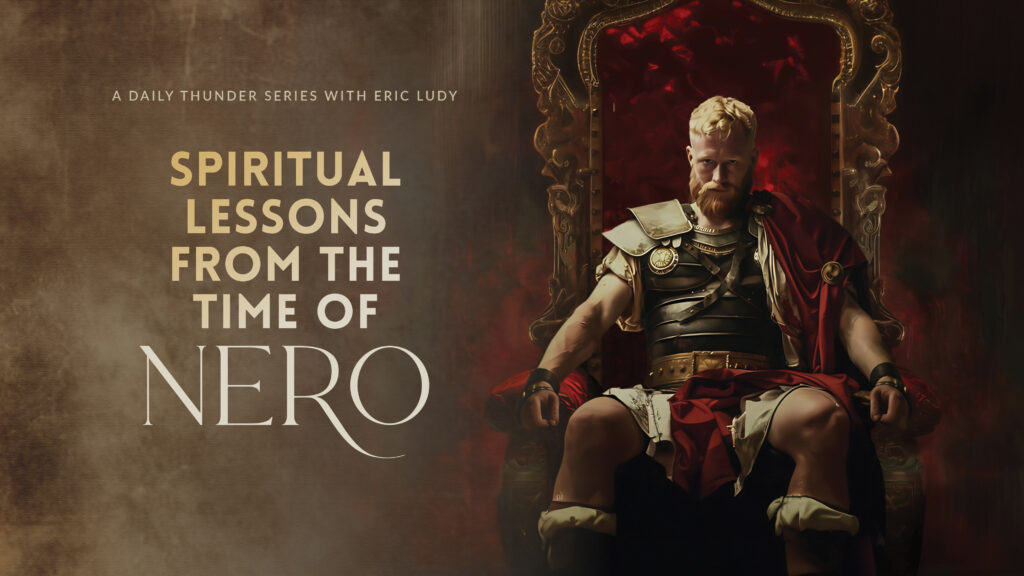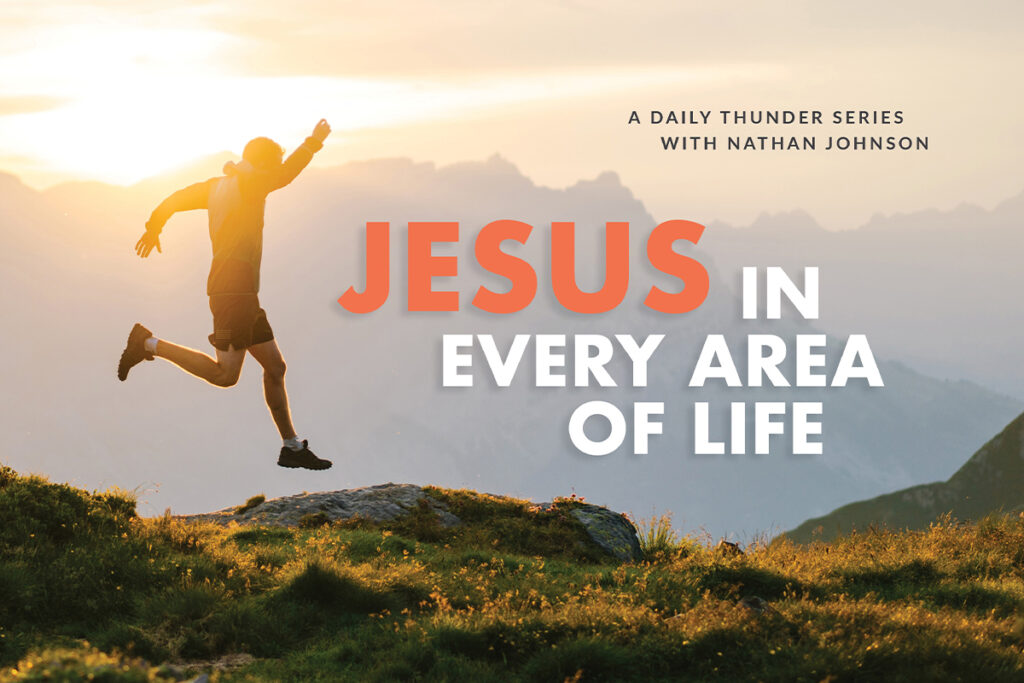A Daily Thunder Series with Eric Ludy
Spiritual Lessons from
the Time of Nero
The times of Roman Emperor Nero mark in the annals of history a season of unprecedented difficulty and trial for the Christian faith. But, this time was no less challenging for the Jewish people that had chosen to refuse, rather than accept, their long-awaited Messiah.
This study focuses on a period of time between two massive events in first century world history between AD 64 (The Burning of Rome) and AD 70 (The Fall of Jerusalem). To understand what happened in this stretch of time greatly increases a believer’s comprehension of the New Testament and God’s very nature as a good Father. It puts into context the writings of the New Testament and helps to better understand the audience and the spectacular intent behind the Scriptures.
Nero was a terrible man who architected terrible things against God’s people. But out of this outrageous and horrific trial, a triumphant New Testament Church sprang forth — one ready and even eager to die for their precious Lord and Savior with a smile on their lips and a song in their hearts. Simultaneously, the clear fulfillment of Christ’s Word of awful judgment upon the Jews who refused to repent and receive heaven-sent grace was radically set before the nations for awe-inspiring contemplation.
Part 1: A Most Fantastic Event
The time of Nero was an incredibly dark time in history; a time when people suffered under the rule of a madman and sadistic mass murderer. But there is also something that happened in the time of Nero that is absolutely extraordinary—something that can cause a believer’s soul to be stirred with great hope. The time of Nero was not just another oppressive memory on the calendar of antiquity—it was a profound season of punctuation to the work of Christ Jesus on the Cross. It was a time of fulfilled prophecy; a time when the Church of Jesus Christ emerged as an unstoppable force in this world. This is the first episode in this exciting Daily Thunder summer series. Let the adventure begin!
Part 2: I Work at Starbucks
In this episode, Eric lays the foundation for understanding this extraordinary time period of history (from 64 to 70 AD) and the way that knowing this human history can actually impact the lens that a student of Scripture wears in interpreting the text of the Book of Revelation. Utilizing a humorous misunderstanding regarding his possible employment at Starbucks, he unpacks the very real schism the Body of Christ today experiences over this apocalyptic vision. He also shows how it is actually quite reasonable to come to differing viewpoints on the matters in question inside this mysterious book.
Part 3: Great Balls of Fire
In this episode, Eric investigates the history of the Temple and explains how the work of Christ on the Cross was a clear departure from one temple system in order to establish a far superior temple system in the bodies of those that believe in Jesus Christ.
Part 4: When Michael Stands
In this episode Eric dives into the deep end of Scripture and wrestles with the prophecies of Daniel, demonstrate how they set the stage beautifully for the arrival of the Mercy-Seat-sitting Jesus Christ. But, not just that—it’s the arrival of the Altar-Standing Jesus Christ, as well.
Part 5: The Art of Trembling
In this episode Eric discusses the profound nature of God’s Holy Presence and how there is a right and a wrong way to enter into it. He also shows how the presumptive entry into this Almighty Presence has led to many catastrophic outcomes throughout history.
Part 6: The Ash of Antioches
In this episode Eric demonstrates throughout the Biblical record (and even in the history of the Jews unrecorded in the Biblical record) a clear pattern of God’s divine purposefulness in allowing weakness in the men and nations He favors. And He does this in order to showcase His strength in and through that very weakness. With a Gideon-esque intentionality, He often will shrink down our earthly forces before He marshals His heavenly ones to fight on our behalf. And in so doing, He never fails to bring beauty out of ash.
Part 7: Clear as Mud
In this episode Eric addresses the hard-to-understand style of prophetic and apocalyptic writings in Scripture. Why did God give us these strange and challenging books, and how, as the Body of Christ, are we supposed to approach them? Because, for many, these pieces of divine communication are as clear as mud.
Part 8: The Puzzling End
In this installment Eric explores the concept of “The End.” There seem to be two kinds of ends mentioned in Scripture—1) The ends of eras, times, and temporary systems of government, and 2) The end of all things. This distinction matters. And it’s very easy to confuse the two—unwittingly thinking that an ending which refers to the conclusion of a particular epoch of history is instead a proclamation of the end of the heavens and the earth. This message is, like its name, a puzzle—and a rather fun one at that.
Part 9: The Golden Chariot
In this message Eric takes us one step further into the puzzling territory of the End, the destruction of Jerusalem, and the Son of Man coming in the clouds. This message will send both a holy thrill and a holy trembling through your spiritual being. There is a “golden chariot” described in and throughout Scripture upon which God rides. And, it is on this chariot that the Almighty comes to bring judgment. But, this same chariot that should elicit awe and fear in those soon to be trampled beneath its wheels—elicits awe and joy in those that have gained the amazing privilege of actually sitting with the Almighty Charioteer when He comes in power.
Part 10: Mr. Sneaky
In this episode Eric discusses the “culture of silence” that religious communities are prone to establish as the means of protecting the integrity of their denominational identity. Like caution tape, certain topics or ideas become “roped off” and “inaccessible” to the laymen. “We don’t talk about that in this church” or “we don’t ask those questions around here” become either the spoken or the unspoken messages. But, inevitably, cordoning off these topics leads to a weakening and never a strengthening of the Body of Christ. Like Nicodemus, we must go to Jesus with our questions, even if it be “sneakily” at night.
Part 11: The Great Cover-Up
In this episode Eric discusses the historical agenda of the Devil to distort the working of God, to twist the words of God, and to obscure the Good News from clear sight. The Devil works to bury the amazing accomplishments of God while the Holy Spirit works to reveal them. But who is going to win? It is a well known fact that when Light and Dark battle it out head-to-head, that Light always comes out the victor.
Part 12: Classic God
In this episode Eric puts out on the table his most important puzzle piece for the series. It’s the puzzle piece that most clearly demonstrates his goal in putting this all together and the one that has given him passion to actually systematically address all these awkward and difficult matters pertaining to the End. It’s all summed up in what he describes as the Principle of the Here-and-Now.
Part 13: The Tangled Jungle
In this episode Eric gives an overview of the arduous task it is to understand and make sense of the Book of Revelation. Many scholars have concluded that it is a waste of time to even try to comprehend the meaning of this apocalyptic masterpiece. But the Book itself declares that there is a blessing waiting for anyone that dares to read it, hear it, and keep its words. If we genuinely believe in the purposefulness of every single word in the Scriptures, it only makes sense that at the far side of this tangled jungle, is a glorious reward—a greater understanding of the Person of the Jesus Christ.
Part 14: The Bionic Ear
In this installment Eric discusses the unique phrase in Scripture, “He who has an ear let him hear.” It’s an odd statement and responsively many of us think, “Wait a minute! Don’t we all have an ear?” Yes, we do have physical ears, but not all of us possess spiritual ears. And spiritual ears are what is necessary to be able to hear and understand what God is saying to His Church. To understand and comprehend the mysteries of Scripture demands the presence of the “Bionic ear.”
Part 15: On the Spectrum
In this episode Eric labors to parallel today’s modern church with a child “on the spectrum.” Strangely, it is much easier to give grace, patience, and understanding to someone known to be injured, malnourished, and/or otherwise neglected in their development, than it is to someone deemed privileged. And that is why it is important to note that much of the Church today has been stunted in their development and is showing serious signs of social backwardness because of that stunting. The majority of Christians in the West are used to an undernourished diet of unhealthy filler food and have not gained an appetite for real spiritual substance. If we can understand this “spiritual stunting” that surrounds us, it ought to make it easier to show grace and patience to the strange “spectrum” behaviors we are presently encountering in the Church.
Part 16: Smelling the Flowers
In this episode Eric asks his listeners to take off their doom and gloom glasses and put on their rose-colored ones. Strangely, for many people, the Book of Revelation is an oppressive, anxiety-inducing piece of God-ordained literature. But, ironically, the book’s purpose is totally opposite that. Its primary purpose is to reveal Jesus Christ. And many people miss the innate beauty hidden in this Divine Masterpiece because they first try to solve the book instead, of first trying to see Jesus in the book.
Part 17: Soon
In this episode Eric addresses the perplexing matter of time indicators associated with the prophecies of the New Testament. When the Scriptures say, “The time is near, He is coming quickly,” or “This will take place in this generation”—should we actually take that time declaration seriously, or are the Scriptures speaking in some sort of enigmatic heavenly symbolic language towards the concept of time? Many Christians today have jokingly concluded that when Jesus says “soon” He actually means “in two thousand or so years from now.” How should we appropriate this things? Because our expectations (and therefore, our faith) remain restless until we better understand God’s communication on time.
Part 18: The Ludy Circus
In this episode Eric explores the bizarre cultural setting of Rome in 64 AD. Rome’s cultural system centered around The Games, known as the Ludi (or Ludi Circus). The Ludi Circus was a gargantuan spectacle—the ancient equivalent of Hollywood, NASCAR, MLB, The NFL, The NHL, and The NBA all wrapped into one big thing. In the midst of such a strange and frenzied culture of spectacle, Jesus did His Cross-Work and Christianity exploded onto the scene, creating of stunning spectacle of its own. Now, let the real Games begin!
Part 19: The Sealed Book
This is the nineteenth episode of Eric’s series entitled Spiritual Lessons from the Time of Nero. In this episode he dives into yet another complex mystery, but one that, when solved, should lead us to have great big smiles on our faces. In Revelation 5:5 we learn that the sealed book (that no one in heaven or on earth can open) can now (as of the work of the Cross) officially be opened up. Most of us don’t get as excited as we should in hearing this bit of information. But, the fact remains (even if we don’t comprehend the significance) that The Lion of the Tribe of Judah has prevailed and the sealed Book can now be opened.
Part 20: Put on Those Nikes
The twentieth installment in Eric’s series entitled Spiritual Lessons from the Time of Nero, he explores the surprisingly good news for Christians that is found in the Book of Revelation. It’s easy to focus on the doom of Revelation and dread the idea of going through “tribulation”. But this extraordinary final book of the Bible was not designed to depress the saints of God, but to exhilarate us. When we as the followers of Christ put on our Nikes, the world will be turned upside down. After all, God built us not to lose, but to win.
Part 21: The Man, Nero
This is the twenty-first installment in Eric’s series entitled Spiritual Lessons from The Time of Nero. In this episode he introduces his audience to the infamous Roman emperor, Nero Claudius Caesar Augustus Germanicus. Anyone stuck with such a long name understandably might prove a little grumpy, but Nero’s problems go far beyond being a little grumpy. He seemed to have a problem with everyone in his life. After running out of family members to murder, in 64 AD he turned his angst against the Christians, murdering an immense number of them. But, what is amazing, is that such a disturbed man was still loved by God, and God pursued him, sending Paul the Apostle to stand before him and to testify of the love, longsuffering, and grace of Jesus Christ.
Part 22: The Monster, Nero
In this episode Eric once again returns to the unsavory topic of Emperor Nero. Nero was a man who behaved like a beast and this similitude has triggered many speculations and prognostications regarding his potential puzzle-like fit with the terrible “Therion” mentioned in the book of Revelation by the Apostle John. The Greek word “therion” translates to “wild animal, beast, or feral creature.” And that was exactly what Nero was. But, could it possibly be that John was referring to Nero when he wrote about the “Beast” in the book of Revelation? Futurists say, “No way!” While Preterists shout, “Look at the facts! It’s obvious that John was talking about Nero!” May we prove strong enough as a church to not allow an evil man who persecuted the church two thousand years ago to persecute us again today by becoming the center of a divisive debate.
Part 23: The 40th Parallel
In this episode Eric explains the profound idea of historical parallels in Scripture, where an event in the Old Testament reoccurs centuries later (sometimes thousands of years later) but in a different more extraordinary way that demonstrates Jesus Christ. In addition to discussing various historical parallels revealed in the Text of Scripture, Eric dives deep into paralleling two particular seasons: 1) the 40 year season in the wilderness under Moses, and 2) the 40 year season following the Cross under Christ. This is a profound puzzle piece of this series, tying quite a few of the previous puzzle pieces together into a whole.
Part 24: Don't Force It
In this episode Eric demonstrates the propensity we have as believers to interpret the Scriptures and the events of history through the lens of our convictions. Whereas, this is not bad in itself, there is a propensity we all have to force fit Scripture into our mold rather than to conform our mold around Scripture. Using the example of Christ’s date of death on the Cross, Eric demonstrates how easy it is to be led by a desire for a specific conclusion than by the evidence itself.
Part 25: The Dating Game
In this episode Eric explores the “seemingly unimportant” territory of dating the books of the New Testament. Most people would say, “It doesn’t really matter to me when it was written.” And in a certain sense, it’s true. Someone can believe the words of Scripture and believe that the work of Christ on their behalf is sufficient to save them whether the words were written in 40 AD, 400 AD, or 2024 AD. But, the integrity of the Bible and the trustworthiness of its words are paramount to our confidence-in and obedience-to its words (especially its hard words and its words that appear culturally insensitive and out-dated). The Devil is waging a campaign against the Scripture. He desires to marginalize its power, its supernatural nature, and its trustworthiness. Meanwhile, to counteract this devilish plot, determining a time stamp for when these New Testament books were written CAN ACTUALLY matter.
Part 26: Dating Mr. Difficult
In this episode Eric does the unthinkable. He does a four hundred foot dive into the shark-filled kiddy pool and . . . we still aren’t sure if he survived. Dating the Book of Revelation has been a long held debate in the Church and the reason it is contentious is due to the fact that the two varying camps support their vastly different conclusions based on the supposed date in which it was purportedly written. For instance, if it was written in 64-65 AD then the date would appear to support a Preterist view of Revelation (ie. the events have already happened), while if it was written in 95-96 AD, the date strongly supports a Futurist view of Revelation (ie. the events are still expected to happen). Eric attempts this dangerous dive in order to prove something different than either viewpoint typically attempts to support. He seeks to show that a Preterist and Futurist view can both be compatible in the Christian walk and both have always been important in the Revelation of God’s Kingdom.
Part 27: Tearful Anticipation
In this episode Eric explores the profound life and death of the Apostle Peter. When danger surfaces the average human runs the other way—wanting to get as far away from it as possible. This makes Peter’s decision in 64 AD to courageously head back into Christian-killing Rome instead of run away from it, a remarkable choice. Peter’s subsequent death at the hands of Nero instructs us two thousand years later in the way to truly honor Christ in both life and death.
Part 28: The Battle of the Puny Brains
In this episode Eric attempts to do something that most Christians don’t believe can be done—juggle four vantage points on the Book of Revelation simultaneously. You will need to be the judge as to whether or not he succeeded.
Part 29: The Messiah Vacuum
In this episode Eric dives into the strange history of false messiahs that came flooding into Judea after the Jews rejected the true Messiah. The same profound spiritual vacuum, that plagued first century Judaism, is always created when Jesus is resisted—and it’s true in our lives, as well.
Part 30: Coated in Crimson
In this episode Eric explores the inexplicable increase in earthquakes that filled the time of history between the Cross and the destruction of the Jerusalem in 70 AD. This 40-year period showcases the remarkable way that God cares for His own amid a time of judgment.
Part 31: REal History
In this episode Eric dives into the real recorded history of Rome, Judea, and the Church during this period between 64 and 70 AD and then matches it with Christ’s Olivet Discourse and the Book of Revelation. It is an awe-inspiring fit. No matter your persuasion toward eschatology (the study of the End), it is always complimentary to the development of healthy conclusions to know what has actually transpired in history.
Part 32: The Appeal of Agrippa
In this episode Eric demonstrates how God always supplies space for repentance. He is not quick to judge, but, in fact, is shockingly merciful—desirous that men would repent and turn from their wickedness and believe. For forty year from the Cross to the destruction of Jerusalem, the Holy Spirit was mercifully entreating the unbelieving Jews to wake up, repent, and believe upon Jesus.
Part 33: The Preservation of Josephus
In this episode Eric does a deep dive into the extraordinary story of the Jewish historian, Josephus. The first-century writings of Josephus hold a weighty position in Christian history, for they offer us a unique perspective into the climate surrounding first century Christianity and also showcase the startling fulfillment of the very words of Christ spoken to His disciples prior to His death in the destruction of Jerusalem and the Temple. The supernatural preservation of Josephus is an extraordinary parallel with the supernatural preservation of sacred history in and through his life.
Part 34: The Last Lamb
This is the thirty-fourth and final installment in Eric’s series entitled Spiritual Lessons from The Times of Nero. In this episode he explores the strange and bewildering happenings of the 17th of Tammuz in the year 70 AD. On this day, in the midst of the Roman’s siege on the city of Jerusalem, the priests came down to their final lamb to sacrifice in the daily temple sacrificial ritual. The Jews still remember this difficult day nearly two thousand years later.











